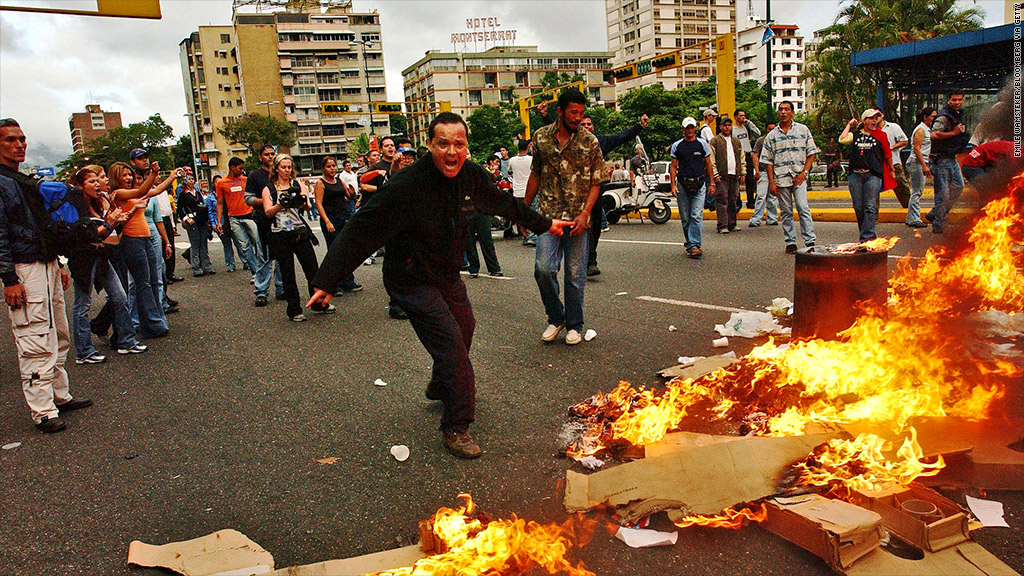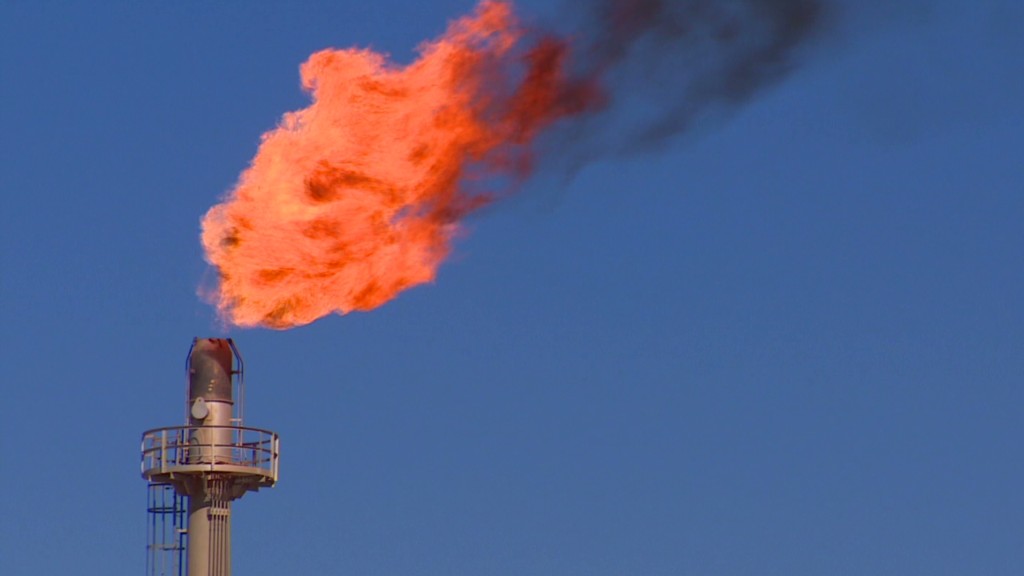
Falling oil prices can have a lot of benefits. They put money into consumers' pockets. They cut trade deficits. They make it cheaper for businesses to sell stuff.
But if oil prices fall over the next few years, as some analysts predict, the effects won't be all roses.
OPEC, for example, could be on the losing end. And that could lead to unrest in countries around the world.
Oil producing nations in the Middle East and elsewhere have used bulging oil revenues of the last few years to placate their people. No place is this more true than Saudi Arabia, which has subsidized housing, health care, gasoline and a host of other things to the tune of hundreds of billions of dollars since the Arab Spring protests began in 2010.
As a result, Saudi Arabia now needs oil prices close to $100 a barrel just to balance its budget. If oil prices fall, it may have to cut social spending. In a country that's been a reliable oil exporter to the global market for over half a century, yet has both a restless segment clamoring for reform as well as extremists in the ranks, the repercussions could extend well beyond OPEC.
"It's not in the U.S. interest to have a more unstable Middle East, even if we are importing no oil from that region," said Meghan O'Sullivan, a professor at Harvard's John F. Kennedy School of Government who specializes in Mideast petro-politics. "Or Russia either," she added, referring to the world's second largest oil exporter.
OPEC in a bind: Thanks to an energy boom in United States, Canada and elsewhere, plus a slowing of Chinese demand as that economy matures and shifts to less energy-intensive industries, demand for OPEC oil may fall by a million barrels a day over the next three years, according to the latest projections from the International Energy Agency.
Coupled with rising oil consumption at home and a projected fall in oil prices, OPEC nations could see a 30% cut in revenue by 2018, according to Trevor Houser, an analyst at the Rhodium Group.
The pain won't be evenly spread. Iran, Venezuela and Nigeria are already thought to be exceeding spending relative to what oil revenues bring in, and are particularly vulnerable to a fall in oil prices in the next few years.
"In Iran, it could be a factor in regime change," said Steffen Hertog, an assistant professor of Middle East policy and economy at the London School of Economics. "It could certainly instigate a wave of popular unrest."
In Venezuela, where previous attempts to bring pennies-a-gallon gas prices closer to market rates preceded deadly riots and the toppling of the government, falling oil revenue could also bring about a change in regime, according to Hertog -- although he thinks the change would probably occur at the ballot box instead of the streets.
David Pumphrey, co-director of the energy and national security program at the Center for Strategic and International Studies, cautions not to read too much into what oil price is needed for a country to balance its budget. During times of low prices in the past, regimes usually make it through. Iran has been operating under sanctions for years, and it hasn't imploded yet.
Still, he agrees that painful cuts will have to be made if oil prices fall.
"Many people do worry about revolution," he said. "The leaders certainly worry about that."
Saudi Arabia, like other Gulf countries, is expected to weather a short-term drop in oil prices just fine -- the country has plenty of spare cash. The question is more how events play out in the long term.
On the supply side, some say the shale oil revolution in the United States will be short lived -- that the wells will run dry in a decade or so and shale production will never spread to other countries. There are questions around the sustainability of other unconventional sources of oil as well, such as Canada's tar sands. Others say the production is here to stay, and that it will change the global balance of energy geopolitics.

If it's the latter scenario that comes to pass, "then you really have quite a serious problem for OPEC, an existential problem," said Harvard's O'Sullivan. "They are trying to figure out which way the unconventional revolution will unfold right now."
On the demand side, Saudi Arabia has been trying to cut the amount of oil it uses in non-essential areas, like power generation, and diversify its economy. The subsidies the country provides its citizens are also not sustainable in the long run, especially as the population grows.
"The Saudis know this," said O'Sullivan. "But these are issues that require big cultural changes. It's really a race against time."


